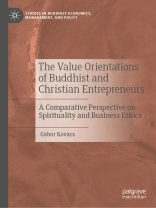This book is a comparative analysis of the value orientations of Buddhist and Christian entrepreneurs and how these values impact business. The chapters review and analyze the concepts of Buddhist economics and the social teaching of the Roman Catholic Church. The value orientations of Buddhist and Christian entrepreneurs are described by irreducible core values that correspond to the ontological conception, the procedural dimension, and the “other directedness” of a spiritual value commitment in business.
The book includes the reflections of Buddhist and Christian entrepreneurs about business spirituality, profit, the temporal perspectives of business, and stakeholder management. The cases testify that a spiritual value orientation can contribute to creating genuine ethical commitment. The findings and the examples can encourage business scholars and practitioners to stop considering ethics as an instrument in the service of profit and serve as inspiration for integrating spirituality into business in a profound way.
This book will be of interest to scholars studying business ethics, workplace spirituality and faith at work.
Cuprins
Chapter 1: Introduction.- Chapter 2: Basic Concepts.- Chapter 3: Business Spirituality.- Chapter 4: Buddhist Values in Business.- Chapter 5: Christian Values in Business.- Chapter 6: A comparative Analysis of Buddhist and Christian Value orientations in Business.- Chapter 7: Spirituality and Materialism in Business.- Chapter 8: Spiritually Inspired Business Practices.- Chapter 9: Conclusion and Way Forward.
Despre autor
Gábor Kovács is assistant professor at the Business Ethics Center at the Corvinus University of Budapest, Hungary. He completed his Ph D studies in 2017, and received his master’s degree in Buddhist studies from the Budapest Buddhist University in 2010. He has been secretary of the Hungarian Bhutan Friendship Society since its foundation in 2011. He has been a member of the Pali Translation Group, whose goal is to translate the Pali Buddhist Scriptures from the Pali Canon into the Hungarian language, since 2008. He has also been a member of the European SPES (Spirituality in Economics and Society) Institute since 2010.












